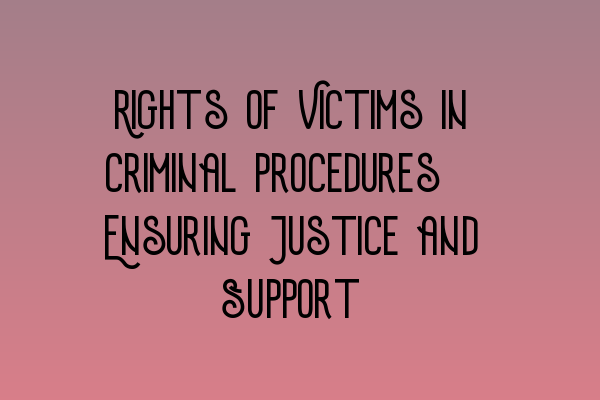Rights of Victims in Criminal Procedures: Ensuring Justice and Support
When a crime is committed, it not only affects the accused and society as a whole but also leaves a lasting impact on the victims. It is, therefore, crucial to recognize and safeguard the rights of victims throughout the criminal justice process. Victims deserve justice, support, and a fair chance to rebuild their lives. In this article, we will explore the various rights that victims have in criminal procedures, emphasizing the importance of ensuring their well-being and involvement.
1. Right to Information
One of the fundamental rights of victims is to be informed about their case’s progress and proceedings. They should receive timely updates on significant developments, such as the arrest and release of the accused, bail conditions, court hearings, and trial dates. This ensures that victims remain aware and involved in the process, allowing them to make informed decisions regarding their case.
2. Right to Support
Victims often experience physical, emotional, and psychological trauma as a result of the crime committed against them. It is crucial to provide them with the necessary support services, such as counseling, medical assistance, and financial compensation. These support services help victims cope with the aftermath of the crime and begin the process of healing and rebuilding their lives.
Furthermore, SQE 1 Preparation Courses aim to equip aspiring solicitors with the knowledge and skills necessary to effectively represent victims and ensure their rights are protected.
3. Right to Protection
Victims should feel safe and secure throughout the criminal justice process. They have the right to protection from intimidation or harm, whether physical or emotional, by the accused or any other party involved in the case. This includes measures such as restraining orders, safe houses, and providing anonymity during the trial. Ensuring the safety of victims allows them to participate more freely and truthfully in the proceedings.
4. Right to Participation
Victims should have the right to actively participate in the criminal justice process. This includes the opportunity to make statements, provide evidence, and express their views and concerns regarding the case. Their input should be given due consideration by the court and taken into account when making decisions, such as bail, sentencing, and parole. This active participation empowers victims, giving them a sense of control and ownership over their case.
A comprehensive understanding of criminal law and practice is essential to effectively represent victims and protect their rights. SQE 2 Preparation Courses provide aspiring solicitors with the necessary knowledge and skills to navigate the criminal justice system successfully.
5. Right to Restitution
Victims have the right to seek restitution for the harm they have suffered. This may include financial compensation for medical expenses, property damage, lost wages, and emotional distress caused by the crime. Restitution not only helps victims recover their losses but also holds the offender accountable for their actions. It is crucial to ensure that victims are aware of their right to seek restitution and are provided with the necessary guidance in pursuing this avenue.
Conclusion
The rights of victims in criminal procedures are of utmost importance to ensure justice and support. By recognizing and upholding these rights, we empower victims to actively participate in the process, help them heal, and rebuild their lives. As legal professionals, it is our duty to advocate for the rights of victims and ensure they receive the justice and support they deserve.
For more information on legal practice and preparation for SQE exams, you can visit our related articles:
